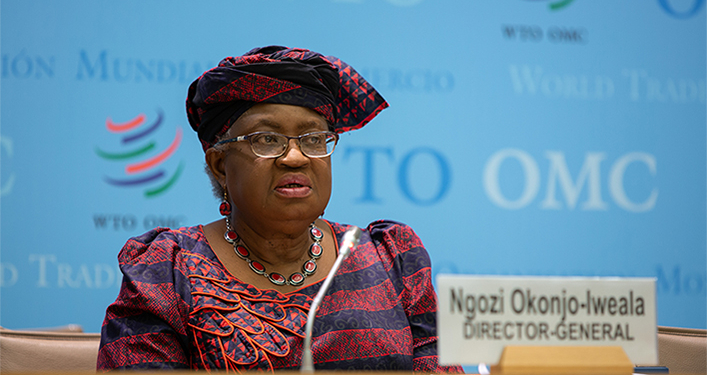The World Trade Organisation (WTO) has implored members to respond to global crisis with a sense of urgency.
This was made known on Sunday by Ngozi Okonjo-Iweala, WTO director-general while giving her opening remarks at the twelfth ministerial conference (MC) in Geneva.
She said it was important for countries to respond quickly to crises, adding that with the full backing from members, the WTO can exercise its duty.
“WTO members must respond to global crises with a sense of urgency. In this regard, you will have to complete the work that will allow the WTO to have a holistic response to this pandemic and future ones. This consists of two parts — a trade and health declaration and a legally binding agreement on a TRIPS waiver,” she said.
“The WTO must also respond to a looming food crisis. Droughts, floods, heat waves, and other extreme weather events had already combined with COVID-19 and pandemic-related supply chain bottlenecks to lead to rising food prices around the world. The war in Ukraine has escalated this situation.
“Many low and middle-income countries import a substantial percentage of their food and agricultural inputs from the region. For example, 35 countries in Africa import food products and 22 import fertilizer from the Black Sea region.
“Low-income countries face a catastrophic situation if action is not taken at both national and international levels.”
Okonjo-Iweala urged members to allow a free flow of food without restrictions.
She added that cultivating the multilateral trade reforms would go a long way in curbing some of the food crises faced by countries at the moment.
“WTO members can contribute by allowing the free flow of food and agricultural inputs, especially for humanitarian purposes. The draft ministerial decision on exempting World Food Programme humanitarian purchases from export restrictions and the draft ministerial declaration on trade and food security give you ministers a chance to make WTO members part of the multilateral solution to this crisis we face,” she added.
“This must be coupled with support to poor countries rich in land and natural resources to produce more of their food. In this regard, we appreciate the various initiatives at the World Bank, the African Development Bank, and the EU presidency’s FARM initiative to provide such support.
“This notwithstanding, several members and groups of members have put forward their priorities on agriculture for decisions or adoption. I hope ministers will find a way forward in agriculture post-MC12. We must not let agriculture drop by the wayside because of our differences.
“Trade is an instrument for development, it’s not an end in itself. In fact, tapping into international markets for value-added goods and services has been history’s most proven path towards development. But too many of our members have not been able to start or stay on this path.
“That’s why special and differential treatment remains necessary. It would be great if members that don’t need special and differential treatment because they are on the right track make clear they won’t avail of it so that flexibilities can go to those who need them.”
Last week, the Food and Agriculture Organisation (FAO) said global food trade system must be kept open and agricultural food must not be taxed.










Discussion about this post